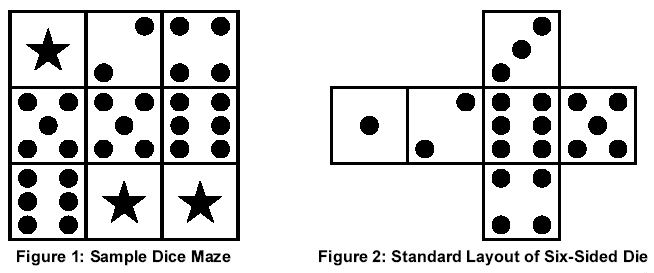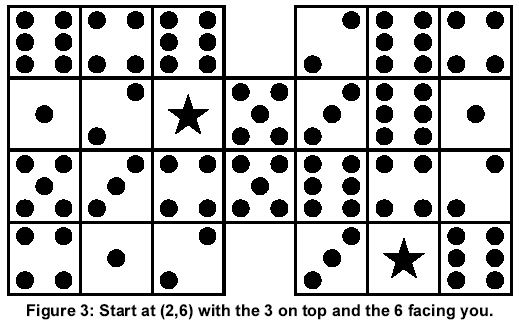poj1872A Dicey Problem
| Home | Problems | Status | Contest |
A
B
C
D
E
F
G
H
I
J
K
L
M
N
O
Time Limit:1000MS Memory Limit:65536KB 64bit IO Format:%I64d & %I64u
Status
Description

To move through the maze you must tip the die over on an edge to land on an adjacent square, effecting horizontal or vertical movement from one square to another. However, you can only move onto a square that contains the same number as the number displayed on the top of the die before the move, or onto a "wild" square which contains a star. Movement onto a wild square is always allowed regardless of the number currently displayed on the top of the die. The goal of the maze is to move the die off the starting square and to then find a way back to that same square.
For example, at the beginning of the maze there are two possible moves. Since the 5 is on top of the die, it is possible to move down one square, and since the square to the left of the starting position is wild it is also possible to move left. If the first move chosen is to move down, this brings the 6 to the top of the die and moves are now possible both to the right and down. If the first move chosen is instead to the left, this brings the 3 to the top of the die and no further moves are possible.
If we consider maze locations as ordered pairs of row and column numbers (row, column) with row indexes starting at 1 for the top row and increasing toward the bottom, and column indexes starting at 1 for the left column and increasing to the right, the solution to this simple example maze can be specified as: (1,2), (2,2), (2,3), (3,3), (3,2), (3,1), (2,1), (1,1), (1,2). A bit more challenging example maze is shown in Figure 3.
The goal of this problem is to write a program to solve dice mazes. The input file will contain several mazes for which the program should search for solutions. Each maze will have either a unique solution or no solution at all. That is, each maze in the input may or may not have a solution, but those with a solution are guaranteed to have only one unique solution. For each input maze, either a solution or a message indicating no solution is possible will be sent to the output.

Input
Output
Sample Input
DICEMAZE1
3 3 1 2 5 1
-1 2 4
5 5 6
6 -1 -1
DICEMAZE2
4 7 2 6 3 6
6 4 6 0 2 6 4
1 2 -1 5 3 6 1
5 3 4 5 6 4 2
4 1 2 0 3 -1 6
DICEMAZE3
3 3 1 1 2 4
2 2 3
4 5 6
-1 -1 -1
END
Sample Output
DICEMAZE1
(1,2),(2,2),(2,3),(3,3),(3,2),(3,1),(2,1),(1,1),(1,2)
DICEMAZE2
(2,6),(2,5),(2,4),(2,3),(2,2),(3,2),(4,2),(4,1),(3,1),
(2,1),(2,2),(2,3),(2,4),(2,5),(1,5),(1,6),(1,7),(2,7),
(3,7),(4,7),(4,6),(3,6),(2,6)
DICEMAZE3
No Solution Possible
用了个bfs就过了,水题,在最后格式输出的时候错了几次,做题的时候,不防做个小正方形,这样省去了大量的想象,速度也快的多!
#include <iostream>
#include <stdio.h>
#include<string.h>
#include<string>
#include <queue>
using namespace std;
int row,column,up,down,n,m,left,right,front,back,startx,starty;
struct mazntree{int x[7];string re;int row,colomn;};
mazntree start,p,temp;
int visit[7][7][50][50];
int map[100][100];
int dir[4][2]={{0,-1},{1,0},{0,1},{-1,0}};
int init()
{
scanf("%d%d%d%d%d%d",&n,&m,&startx,&starty,&up,&front);
if(up==1)
{
if(front==2)
{
start.x[1]=1,start.x[2]=6,start.x[3]=4,start.x[4]=3,start.x[5]=2,start.x[6]=5;
}
else if(front==3)
{
start.x[1]=1,start.x[2]=6,start.x[3]=2,start.x[4]=5,start.x[5]=3,start.x[6]=4;
}
else if(front==4)
{
start.x[1]=1,start.x[2]=6,start.x[3]=5,start.x[4]=2,start.x[5]=4,start.x[6]=3;
}
else if( front==5)
{
start.x[1]=1,start.x[2]=6,start.x[3]=3,start.x[4]=4,start.x[5]=5,start.x[6]=2;
}
}
else if(up==2)
{
if(front==1)
{
start.x[1]=2,start.x[2]=5,start.x[3]=3,start.x[4]=4,start.x[5]=1,start.x[6]=6;
}
else if(front==3)
{
start.x[1]=2,start.x[2]=5,start.x[3]=6,start.x[4]=1,start.x[5]=3,start.x[6]=4;
}
else if(front==4)
{
start.x[1]=2,start.x[2]=5,start.x[3]=1,start.x[4]=6,start.x[5]=4,start.x[6]=3;
}
else if( front==6)
{
start.x[1]=2,start.x[2]=5,start.x[3]=4,start.x[4]=3,start.x[5]=6,start.x[6]=1;
}
}
else if(up==3)
{
if(front==1)
{
start.x[1]=3,start.x[2]=4,start.x[3]=5,start.x[4]=2,start.x[5]=1,start.x[6]=6;
}
else if(front==2)
{
start.x[1]=3,start.x[2]=4,start.x[3]=1,start.x[4]=6,start.x[5]=2,start.x[6]=5;
}
else if(front==5)
{
start.x[1]=3,start.x[2]=4,start.x[3]=6,start.x[4]=1,start.x[5]=5,start.x[6]=2;
}
else if( front==6)
{
start.x[1]=3,start.x[2]=4,start.x[3]=2,start.x[4]=5,start.x[5]=6,start.x[6]=1;
}
}
else if(up==4)
{
if(front==1)
{
start.x[1]=4,start.x[2]=3,start.x[3]=2,start.x[4]=5,start.x[5]=1,start.x[6]=6;
}
else if(front==2)
{
start.x[1]=4,start.x[2]=3,start.x[3]=6,start.x[4]=1,start.x[5]=2,start.x[6]=5;
}
else if(front==5)
{
start.x[1]=4,start.x[2]=3,start.x[3]=1,start.x[4]=6,start.x[5]=5,start.x[6]=2;
}
else if( front==6)
{
start.x[1]=4,start.x[2]=3,start.x[3]=5,start.x[4]=2,start.x[5]=6,start.x[6]=1;
}
}
else if(up==5)
{
if(front==1)
{
start.x[1]=5,start.x[2]=2,start.x[3]=4,start.x[4]=3,start.x[5]=1,start.x[6]=6;
}
else if(front==3)
{
start.x[1]=5,start.x[2]=2,start.x[3]=1,start.x[4]=6,start.x[5]=3,start.x[6]=4;
}
else if(front==4)
{
start.x[1]=5,start.x[2]=2,start.x[3]=6,start.x[4]=1,start.x[5]=4,start.x[6]=3;
}
else if( front==6)
{
start.x[1]=5,start.x[2]=2,start.x[3]=3,start.x[4]=4,start.x[5]=6,start.x[6]=1;
}
}
else if(up==6)
{
if(front==2)
{
start.x[1]=6,start.x[2]=1,start.x[3]=3,start.x[4]=4,start.x[5]=2,start.x[6]=5;
}
else if(front==3)
{
start.x[1]=6,start.x[2]=1,start.x[3]=5,start.x[4]=2,start.x[5]=3,start.x[6]=4;
}
else if(front==4)
{
start.x[1]=6,start.x[2]=1,start.x[3]=2,start.x[4]=5,start.x[5]=4,start.x[6]=3;
}
else if( front==5)
{
start.x[1]=6,start.x[2]=1,start.x[3]=4,start.x[4]=3,start.x[5]=5,start.x[6]=2;
}
}
int i,j;
for(i=1;i<=n;i++)
{
for(j=1;j<=m;j++)
{
scanf("%d",&map[i][j]);
}
}
return 1;
}
bool changecan(int i)//判定能否走
{
int x[7];
for( int j=1;j<7;j++)
{
x[j]=p.x[j];
}
p.row=p.row+dir[i][0];
p.colomn=p.colomn+dir[i][1];
if((map[p.row][p.colomn]!=0)&&p.row>=1&&p.row<=n&&p.colomn>=1&&p.colomn<=m&&((p.x[1]==map[p.row][p.colomn])||(map[p.row][p.colomn]==-1)))//不越界
{ if( i==0)//左移
{
p.x[3]=x[1];
p.x[4]=x[2];
p.x[2]=x[3];
p.x[1]=x[4];
p.re=temp.re+'0';
}
else if(i==1)//下称
{
p.x[5]=x[1];
p.x[6]=x[2];
p.x[2]=x[5];
p.x[1]=x[6];
p.re=temp.re+'1'; }
else if ( i==2)//右移
{
p.x[4]=x[1];
p.x[3]=x[2];
p.x[1]=x[3];
p.x[2]=x[4];
p.re=temp.re+'2'; }
else if (i==3)//上移
{
p.x[6]=x[1];
p.x[5]=x[2];
p.x[1]=x[5];
p.x[2]=x[6];
p.re=temp.re+'3';
}
if(visit[p.x[1]][p.x[5]][p.row][p.colomn]==0)//没有访问过-1能走,0不能走
{
visit[p.x[1]][p.x[5]][p.row][p.colomn]=1;//标记为已访问
return true;
}
else
return false;
}
else
{
return false;
}
return false;
}
int bfs()
{
queue<mazntree> q;
int i,xx,yy;
memset(visit ,0,sizeof(visit));
while(!q.empty())//先清空
{
q.pop();
}
start.re="";
start.colomn=starty;
start.row=startx;
q.push(start); while(!q.empty())
{
temp=q.front();
q.pop();
for( i=0;i<4;i++)
{
p=temp;
if(changecan(i))
{ q.push(p);
if(visit[p.x[1]][p.x[5]][p.row][p.colomn]&&(p.row==startx)&&(p.colomn==starty))//找到
{ int count=0;
xx=startx,yy=starty;
count=1;
printf(" (%d,%d),",startx,starty); for( i=0;i<p.re.length()-1;i++,count++)
{
xx=xx+dir[p.re[i]-'0'][0];
yy=yy+dir[p.re[i]-'0'][1];
if(count==0) printf(" "); printf("(%d,%d),",xx,yy); if(count==8)
{
printf("\n");
count=-1;
}
}
xx=xx+dir[p.re[i]-'0'][0];
yy=yy+dir[p.re[i]-'0'][1];
printf("(%d,%d)\n",xx,yy); return 1;
}
}
}
}
printf(" No Solution Possible\n");
return -1;
}
int main()
{
char str[200];
while(1)
{ gets(str);
if(str[0]=='E'&&str[1]=='N'&&str[2]=='D')
break;
init();
printf("%s\n",str);
gets(str);//把最后的回车吸收
bfs();
}
return 0;
}
FAQ | About Virtual Judge | Forum | Discuss | Open Source Project
All Copyright Reserved ©2010-2012
HUST ACM/ICPC TEAM
Anything about the OJ, please ask in the
forum, or contact author:
Isun
Server Time:
poj1872A Dicey Problem的更多相关文章
- poj 1872 A Dicey Problem WA的代码,望各位指教!!!
A Dicey Problem Time Limit: 1000MS Memory Limit: 65536K Total Submissions: 832 Accepted: 278 Des ...
- UVA 810 - A Dicey Problem(BFS)
UVA 810 - A Dicey Problem 题目链接 题意:一个骰子,给你顶面和前面.在一个起点,每次能移动到周围4格,为-1,或顶面和该位置数字一样,那么问题来了,骰子能不能走一圈回到原地, ...
- UVA-810 A Dicey Problem (BFS)
题目大意:滚骰子游戏,骰子的上面的点数跟方格中的数相同时或格子中的数是-1时能把格子滚过去,找一条从起点滚到起点的路径. 题目大意:简单BFS,状态转移时细心一些即可. 代码如下; # include ...
- A Dicey Problem 骰子难题(Uva 810)
题目描述:https://uva.onlinejudge.org/external/8/810.pdf 把一个骰子放在一个M x N的地图上,让他按照规定滚动,求滚回原点的最短路径. 思路: 记忆化 ...
- Uva - 810 - A Dicey Problem
根据状态进行bfs,手动打表维护骰子滚动. AC代码: #include <iostream> #include <cstdio> #include <cstdlib&g ...
- BFS广搜题目(转载)
BFS广搜题目有时间一个个做下来 2009-12-29 15:09 1574人阅读 评论(1) 收藏 举报 图形graphc优化存储游戏 有时间要去做做这些题目,所以从他人空间copy过来了,谢谢那位 ...
- 1199 Problem B: 大小关系
求有限集传递闭包的 Floyd Warshall 算法(矩阵实现) 其实就三重循环.zzuoj 1199 题 链接 http://acm.zzu.edu.cn:8000/problem.php?id= ...
- No-args constructor for class X does not exist. Register an InstanceCreator with Gson for this type to fix this problem.
Gson解析JSON字符串时出现了下面的错误: No-args constructor for class X does not exist. Register an InstanceCreator ...
- C - NP-Hard Problem(二分图判定-染色法)
C - NP-Hard Problem Crawling in process... Crawling failed Time Limit:2000MS Memory Limit:262144 ...
随机推荐
- MVC验证13-2个属性至少输入一项
原文:MVC验证13-2个属性至少输入一项 有时候,我们希望2个属性中,至少有一个是必填,比如: using Car.Test.Portal.Extension; namespace Car.Te ...
- mvc之验证IEnumerable<T> 类型,多选框验证
原文:mvc之验证IEnumerable<T> 类型,多选框验证 假设我们有这么一种需求,我们要同时添加年级和年级下面的多个班级,我们一般会像下面这种做法. Action中我们这样接收: ...
- DB2建表语句
db2 => create table test (name char(8) not null primary key,depid smallint,pay bigint) DB20000I S ...
- 第1章2节《MonkeyRunner源码剖析》概述:边界(原创)
天地会珠海分舵注:本来这一系列是准备出一本书的,详情请见早前博文“寻求合作伙伴编写<深入理解 MonkeyRunner>书籍“.但因为诸多原因,没有如愿.所以这里把草稿分享出来,所以错误在 ...
- 快速构建Windows 8风格应用5-ListView数据控件
原文:快速构建Windows 8风格应用5-ListView数据控件 本篇博文主要介绍什么是ListView数据控件.如何构建ListView数据控件. 什么是ListView数据控件? 1) Li ...
- Web神器WebStorm 8.0测试版发放(慧都独家)
WebStorm 8.0测试版的发放,标志着WebStorm规划构建的发展成熟. 此次WebStorm 8.0测试版的主要变化是支持高级的AngularJS和集成Spy-js JavaScript跟踪 ...
- web中国的数据分析过程
1 获得web原始数据 2 确定数据编码 例如:是不是url编码或base64编码 3 如果有必要的解码编码 4 确定原始数据和本地字符集显示字符集 5 字符集转换 6 显示 版权声明:本文博客原创文 ...
- Python开发工具Wing IDE发布5.0.1版本
Wing IDE是一个跨平台的Python IDE,提供了一个专业代码编辑.自动编辑.自动完成.重构.强大的图形调试器.版本控制.单位测试.搜索及其他功能.目前已经成为最全面.最综合.最先进的智能化P ...
- [译]ava 设计模式之职责链
(文章翻译自Java Design Pattern: Chain of Responsibility) 职责链模式的主要设计思想是为了构建一连串的处理单元,如果阈值满足的话那么这个单元就来处理这个请求 ...
- asp.net如何实现word文档在线预览
原文:asp.net如何实现word文档在线预览 实现方式:office文档转html,再在浏览器里面在线浏览 1.首先引入com组件中office库,然后在程序集扩展中引入word的dll 2.将M ...
